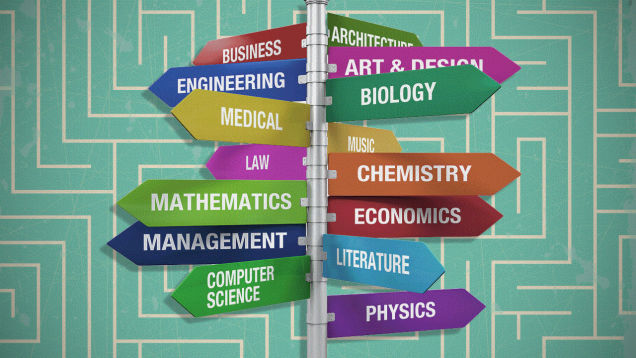Due to falling post-graduate employment numbers and rising cost of tuition, many people are beginning to rethink the value of certain majors and degree programs.
Researchers are now investigating which majors provide a descent return on investment and which don’t. Does it really matter what college major you pursue? Well, a lot of people didn’t think so until recently.
Students who major in STEM fields — science, technology, engineering and math — find jobs quicker, earn more money, and experience more job stability than students who earn degrees in liberal arts and humanities fields. In a tight job market, or during a recession, recent graduates with degrees in social sciences, humanities or liberal arts can find it challenging to find gainful employment.
While the answer to the dilemma seems very straight forward to most — earn a degree in a field with high earning potential — some argue that the answer isn’t so simple. A few educators at Oregon State University, suggest that forcing people into a major, such as computer science, simply because it yields a relatively high financial return on investment may create shortages in occupation that are just as important to the economic future of our country. These same educators also assert that it’s not fair to compare STEM majors head to head with more non-technical majors because students interested in degrees in the social sciences, humanities or liberal arts might be looking for personal rewards that are not financial in nature.
Not all degrees are equal. But you may be surprised to find how valuable different degrees actually are. A recent report published by the Georgetown Public Policy Institute (GPPI), a leading public policy program at Georgetown University, found majors yielding some of the lowest unemployment rates are chemistry, finance and nursing. While recent graduates of engineering, mathematics, and computer science programs demanded the highest starting salaries ($56,000+), unemployment rates in these job sectors were about average. It came as no surprise that anthropology, photography and film majors experienced some of the highest rates of unemployment just out of college, however, the report also showed that students who majored in architecture and information systems also experienced relatively high unemployment rates as well. Students who majored in fine arts has some of the lowest starting salaries of any group.
A study produced by the Employment Department for the state of Oregon corroborated the findings published by GPPI — job opportunities for nursing, engineering and computer science majors were substantially greater than those who majored in architecture, arts, and related fields.
Even with all the evidence, a tough job market, and the increasing cost of attending college, many students are still enrolling in social science, humanities and liberal arts majors. In some state the number of students enrolled in social science, fine arts or humanities majors outnumbers students majoring in STEM fields 10 to 1.
Proponents of non-STEM majors argue that a good liberal arts education develops well-rounded students that can succeed in any number of jobs. Proponents of STEM majors point out that many students opt for liberal arts majors because they are not as difficult and require less work to get good grades. However, all agree that acquiring leadership, communication, analytical and problems solving skills in college is what’s most important to future success — regardless of how it occurs.
Which ever educational path students choose to pursue, they must be better prepared to face an increasingly competitive job market and turn their college education into a winning proposition.

